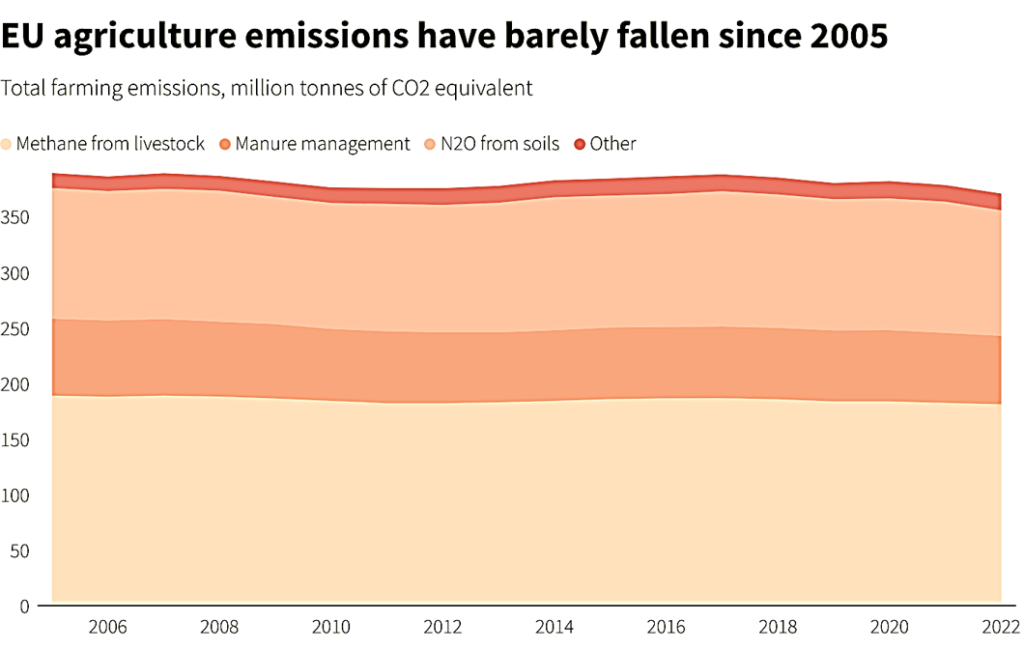A more rightward-leaning European Parliament will complicate the passage of ambitious EU climate policies.
However, most of Europe’s current leading green policies are expected to remain intact, according to lawmakers, officials, and analysts.
Provisional results from the European Parliament election on Sunday night showed centrist parties maintaining a majority. However, gains for right-wing and far-right parties, who are skeptical of the EU’s “Green Deal” package, and significant losses for Green parties were also observed.
Challenges Ahead
“I don’t think we’ll roll back on climate policies, but it will be more complicated to initiate new ones,” said Bas Eickhout, head of the European Parliament’s Greens group, to Reuters.
The future of EU climate measures over the next five years will hinge on the incoming European Commission, which proposes EU laws. However, the newly-elected European Parliament will influence every new green policy.
The election result indicates tougher approval for new EU climate measures. “All new policies will be harder to pass, but backsliding is very unlikely,” stated Krzysztof Bolesta, Poland’s secretary of state for climate, to Reuters.
Julian Popov, former environment minister of Bulgaria, agreed and said that populistic reasons might delay new ambitions. This could affect the upcoming 2040 EU climate target, which aims to steer the EU towards its 2050 net zero emissions goal.
The EU Commission has proposed an ambitious 90% emissions cut by 2040, needing approval from both EU countries and the Parliament.
Sector-Specific Decisions
The upcoming European Commission and Parliament will face tough decisions on introducing new policies to push industries towards the 2040 target, including the farming sector, whose emissions have barely fallen since 2005.

However, after months of protests by farmers across Europe, there is little political appetite to target this sector with new rules, especially if they would increase food prices for citizens already facing significant living cost increases.
No Major Reversals Expected
While new climate measures might face tougher scrutiny, a full-scale reversal of the numerous EU climate policies passed in the last five years would be legally challenging.
EU law enshrines these policies, including renewable energy targets and a strengthened carbon pricing regime on power and industry, and all 27 member states are implementing them.
Many are already operational, with EU emissions down nearly a third from 1990 levels, and Europe installing wind and solar energy capacity at record speed.
Controversial Policies Under Review
Despite progress, the election campaign saw increasing calls from the right to scrap some Green Deal policies, particularly the EU’s 2035 ban on new petrol and diesel cars. This policy includes a 2026 review clause, on which the Parliament will have a say.
Italian Prime Minister Georgia Meloni told Open magazine last week, “We must correct this ideological folly.”
Three EU diplomats highlighted that European Commission President Ursula von der Leyen will face pressure to weaken the 2035 car policy, even from some lawmakers in her centre-right European People’s Party who want it scrapped.

Von der Leyen needs support from a majority of lawmakers in the new European Parliament to secure a second term. However, broad climate policy rollbacks are unlikely.
This is partly because the EU’s existing climate measures are essential to meeting its 2030 climate target—cutting net greenhouse gas emissions by 55% from 1990 levels—which both national governments and lawmakers have approved into EU law.
Shifting Rhetoric, Steady Action
Unlike the last EU election in 2019, where millions of young people protested for climate action, issues like immigration, economic concerns, and struggling European industries dominated this year’s campaign.
Meeting the EU’s 2030 climate target will require investments of 1 trillion euros per year, a significant increase from the 2010-2020 period, according to the European Investment Bank.
Investing in local industries was a common campaign pledge across the political spectrum as competition intensifies with the U.S. and China to produce green tech like low-carbon steel and electric cars.
Possible Outcomes
Some analysts believe this focus could lead the EU to allocate more funds and policies to support climate-friendly projects, but with an emphasis on helping industry rather than purely on being green and clean.
“If it’s about scaling up manufacturing of green technologies in Europe, then that may be done in the name of ‘industrial competitiveness’ rather than for the climate,” said Linda Kalcher, Executive Director at think-tank Strategic Perspectives. “We might see the rhetoric shifting, but the actions on the ground remaining the same,” Kalcher noted.